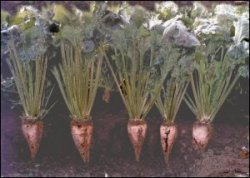
 2
2




 1
1




We cannot change the waves of expansion and contraction, as their scale is beyond human control, but we can learn to surf. Nicole Foss @ The Automatic Earth




 1
1





Idle dreamer
 1
1




Kent
 1
1












Idle dreamer




"Limitation is the mother of good management", Michael Evanari
Location: Southwestern Oregon (Jackson County), Zone 7
 2
2












Dale Hodgins wrote:I've been checking out the possibility of growing sugar beets.
...
Few of us need to increase our sugar consumption but by growing our own we can choose to eat a much better product that doesn't feed agribusiness. It is a very cheap commodity so not something I would envision producing commercially as things stand today.
Other uses- Pulp is commonly fed to livestock. They mix it with less palitable food just as is done with molasses.
- finely ground fibre used in laxitives
- tops eaten like spinnach
The beans from some of these unimproved and unappreciated
wildlings carry more than 30 percent of sugar. This is equal
to the best sugar beets and more than the yield of the richest
crops of sugar cane. This, too, after man has been struggling
with the sugar cane for centuries.
Forest-field-plow-desert- that is the cycle of the hills under plow agricultures.
My project thread
Agriculture collects solar energy two-dimensionally; but silviculture collects it three dimensionally.












Steven Gayler wrote:Is the sugar from beets red?
My project thread
Agriculture collects solar energy two-dimensionally; but silviculture collects it three dimensionally.








My project thread
Agriculture collects solar energy two-dimensionally; but silviculture collects it three dimensionally.




Cj Verde wrote:
Dale Hodgins wrote:I've been checking out the possibility of growing sugar beets.
...
Few of us need to increase our sugar consumption but by growing our own we can choose to eat a much better product that doesn't feed agribusiness. It is a very cheap commodity so not something I would envision producing commercially as things stand today.
Other uses- Pulp is commonly fed to livestock. They mix it with less palitable food just as is done with molasses.
- finely ground fibre used in laxitives
- tops eaten like spinnach
Sigh.
I think part of the deal with permaculture is that it has a design component that people miss or misunderstand. Really, people should start with a goal and explore all options that would fulfill that goal.
So is your goal to grow sugar beets or to use "a much better product that doesn't feed agribusiness" or something else?
 1
1




Dale Hodgins wrote:
Other uses- Pulp is commonly fed to livestock. They mix it with less palitable food just as is done with molasses.
- finely ground fibre used in laxitives
- tops eaten like spinnach
My project thread
Agriculture collects solar energy two-dimensionally; but silviculture collects it three dimensionally.




Dale Hodgins wrote:The goal is as stated --- to grow my own sugar from sugar beets. The reason is so that I'll have an unadulterated product that bypasses agribusiness and nothing else.
My project thread
Agriculture collects solar energy two-dimensionally; but silviculture collects it three dimensionally.




My project thread
Agriculture collects solar energy two-dimensionally; but silviculture collects it three dimensionally.
 2
2




Cj Verde wrote:
Dale Hodgins wrote:The goal is as stated --- to grow my own sugar from sugar beets. The reason is so that I'll have an unadulterated product that bypasses agribusiness and nothing else.
If you want to do the work of the bees, well, knock yourself out! Sort of like that that vegan who asked Sepp how to get rid of blackberries (or whatever) if he didn't have pigs. "Then you'll have to do the pigs work!"
 I've just been compared to the most infamous buffoon to ever be displayed for public ridicule on the forum. The guy is like a living cautionary tale on the dangers of maternal drug usage.
I've just been compared to the most infamous buffoon to ever be displayed for public ridicule on the forum. The guy is like a living cautionary tale on the dangers of maternal drug usage. 







Dale Hodgins wrote:[Then we can compare the .5% sugar content of Broadleaf Maple sap to 20% sugar beets and figure out how much less firewood that would take.
The beans from some of these unimproved and unappreciated
wildlings carry more than 30 percent of sugar. This is equal
to the best sugar beets and more than the yield of the richest
crops of sugar cane. This, too, after man has been struggling
with the sugar cane for centuries.
My project thread
Agriculture collects solar energy two-dimensionally; but silviculture collects it three dimensionally.
 2
2




Dale Hodgins wrote:Finally, I'll see if I can wrap my head around a complex process called --- CHOP, SQUEEZE, BOIL = SUGAR --- apparently it's beyond my power to comprehend.

My project thread
Agriculture collects solar energy two-dimensionally; but silviculture collects it three dimensionally.
 2
2




 1
1




Dale Hodgins wrote:The idea would be to then incorporate the raw chips into foods requiring sugar. The chips could be eaten as candy on their own. These chips would contain all of the fibre, protein and minerals inherent in beets. I've eaten beet chips but never chips from the sugar beet. It's not much of a leap to try this.
Sugar beets, alas, taste like beets. They will add a beety flavor to whatever you add them to, and not just sweetness. I think I tried making muffins with them as a sugar substitute. The beetness definitely comes through and without refining, the sweetness is not especially intense.
My project thread
Agriculture collects solar energy two-dimensionally; but silviculture collects it three dimensionally.
 1
1




 Mine also were not dried, they were just grated fresh. Dried beets would have a more concentrated sweetness, I think. I think it's worth a try.
Mine also were not dried, they were just grated fresh. Dried beets would have a more concentrated sweetness, I think. I think it's worth a try.
Idle dreamer
 2
2




 1
1




 1
1




Dale Hodgins wrote:Lacia, I have a few questions if you will.
1. Are there cultivars that have a less beety flavor and would optimal growing conditions tend to increase or decrease beetiness ?
2. What was your highest sugar content record ?
3. I have a south facing slope that gets really hot. It is an ampatheatre shaped pocket with zero sun blockage. The sort of spot where broom and gorse thrive. I have started a hugelkultur bed there. I have tons of available water. I'm 8 miles from the ocean and have had success with heat lovers including tomatoes, egg plant, peppers and sunflowers that like my hot conditions.
Would you consider this a suitable spot for sugar beets ?
4. On the woody chip question, I have an idea. I was thinking that dried chips could be finely ground and then the resultant "flour" could be dampened and then rolled out like pizza dough to dry.
Have you ever dried and ground beets ?
If so, did you ever use beet flour for baking or for any other purpose ?
Thank you: Dale

| I agree. Here's the link: http://stoves2.com |





